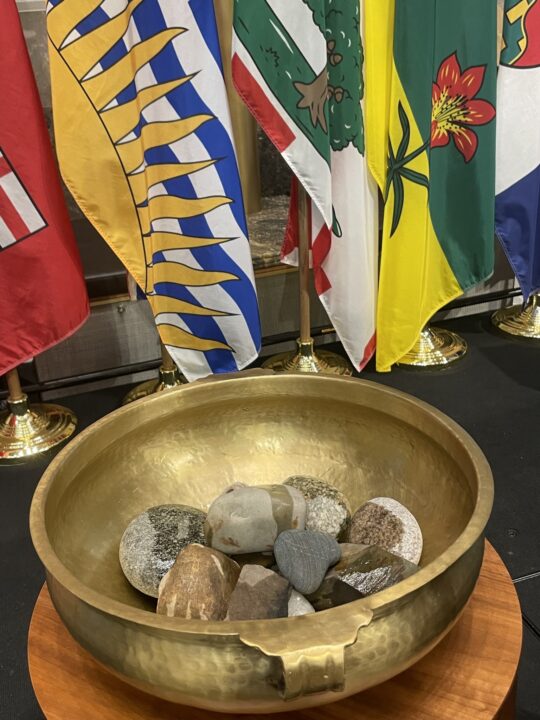By Pastor Maymie Lau
Uniting a Nation in Prayer and Hope
On July 12, I attended the Inauguration of the National Day of Prayer for Canada. This historic event unfolded across the country, one that will shape the nation’s spiritual and cultural landscape for generations to come.
The visionaries behind the National Day of Prayer for Canada sought to create not merely a date on the calendar, but a movement —one that would inspire generations of Canadians to recognize the importance of praying for Canada, acknowledging the faithfulness of God and Jesus as Lord over this nation.
July 12 was chosen as the numbers 7 and 12 are closest to the numbers 7 and 14 from the foundational Bible passage from 2 Chronicles 7:14: “if my people, who are called by my name, will humble themselves and pray and seek my face and turn from their wicked ways, then I will hear from heaven, and I will forgive their sin and will heal their land.”
This passage is a powerful reminder of the transformative power of prayer, and the chosen date symbolizes our commitment to seeking God’s healing and restoration for our nation. Moving forward, the National Day of Prayer for Canada will be observed annually on the weekend closest to July 14.
The Inaugural Observance: A Nation comes together in reflection of Repentance and Prayers
The Inaugural begins with a Worship Rally on Friday evening, July 11, at the Metropolitan Church in Ottawa. Then, on Saturday morning, over 300 Christian leaders from across the nation gathered at the Sir John A. MacDonald Building, located across from Parliament Hill, to participate in worship, prayer, and come into agreement for establishing the National Day of Prayer in Canada. In the afternoon, a Prayer and Worship Rally was held on the lawn of Parliament Hill, open to everyone.
The Leader’s Gathering on Saturday morning began with the grand entry of the First Peoples of Canada, a profoundly significant and influential moment. The Grand Chief led a prayer for Canada in his native language, a moving testament to the spiritual unity of our nation. As the original residents of the land, their participation and declaration that Canada belongs to God was an impactful and unifying force.
The format of the gathering is that of a solemn assembly as described in the Bible.
Four repentance prayers were made:
- A Prayer of Repentance and Restoration for Canada’s First Peoples
- A Prayer of Repentance for Antisemitism and Disregard for the Foreign People
- A Prayer of Repentance and Intercession for Immorality, Greed, and Violence
- A Prayer of Repentance for Disunity, Division, and Corruption in Canada
Each prayer was offered by leaders representing different Provinces.
The order of Provinces to lead in prayer was:
- The founding provinces (that first joined the Confederation in 1868): Quebec, Nova Scotia, New Brunswick, and Ontario
- The Western expansion provinces: Northwest Territories, Manitoba, and British Columbia
- The Prairie provinces and East Coast addition: Alberta, Saskatchewan, and PEI
- The Northern Territories, final East Coast addition and New Canadians: Yukon, Newfoundland-Labrador, Nunavut and Nations
After each repentance prayer, a representative from each Province would put soil brought from that Province into a glass container. They would also place a rock, hand-picked from the province, into a golden bowl. The soil from each Province and the Territories represents the Land of Canada and was offered to our Lord. The idea of gathering the stones originates from Joshua 4, where the 12 tribes collected stones from the Jordan River. May the rocks we brought forth together be a memorial to the people of Canada forever.
Then, the Steering Committee signed the Declaration on stage, and the rest of the leaders proceeded to different stations to sign the Declaration in agreement with the establishment of a National Day of Prayer for Canada.
The Importance of Prayer for Canada
Some may ask: Does prayer make a difference?
History is full of examples of societies and nations transformed by prayer movements.
The seven significant reforms highlighted in the Bible—those of Asa, Jehoshaphat, Joash, Hezekiah, Josiah, Ezra, and Nehemiah—demonstrate how collective engagement in fasting, repentance, and intercession can lead to substantial transformations within a nation.
These practices not only fostered a deeper spiritual connection among the people but also catalyzed important changes across various facets of society.
As these leaders implemented reforms, notable shifts in power dynamics occurred, helping to curb idolatrous influences that had plagued the nation. The introduction of judicial reforms aimed at reducing corruption and addressing social divisions played a critical role in stabilizing the community and renewing its identity. Such reforms created a more unified society, which in turn contributed to military successes and economic prosperity.
Ultimately, the intertwining of spiritual renewal and practical reforms led to a holistic transformation that shaped the nation’s trajectory in a positive direction.
Historical Examples of How Prayer Matters to Canada
When examining Canada’s history, it becomes clear that prayer has had a profound impact on many significant events in the country. These historical examples serve as a reminder of our spiritual heritage and the profound effect of prayer on shaping our nation.
The Revival in Ontario: The Laymen’s Prayer Revival (1857–1858)
In the mid-19th century, a remarkable spiritual awakening swept across North America – the Laymen’s Prayer Revival (also known as the Third Great Awakening). This revival began in Upper Canada (present-day Ontario), with ordinary citizens gathering in churches, barns, and homes to pray for spiritual renewal. The movement sparked widespread transformation in communities, as relationships were mended, crime rates dropped, and charitable action flourished. The Ontario revival was so influential that it inspired similar movements in the United States, laying spiritual foundations that would shape Canadian society for generations. This history illustrates how simple acts of united prayer can ripple outward, transforming hearts and communities, and fostering lasting change.
The Prayer Gathering at Vimy Ridge (1917)
During the First World War, in April 1917, Canadian soldiers faced the daunting task of capturing Vimy Ridge in France. With many innovative tactics, resilience and unified execution, the Canadian army won this battle. The strategic victory defined Canada’s military and national identity. It is recorded that Canadian soldiers relied on prayer for courage, led by chaplains such as Canon Frederick Scott, who held services in the trenches. On the home front, churches organized vigils to pray for victory and safety.
The Urgent Need for Prayers in Canada
Canada is currently facing a multitude of challenging issues that are deeply affecting its citizens. The nation is experiencing economic instability and growing inequality, leaving many people feeling vulnerable. Moreover, social polarization and divisions within communities are contributing to a fractured social fabric.
Mental health and substance abuse crises are also prevalent, impacting the well-being of individuals and families. A concerning trend is the disengagement of youth, who are increasingly feeling disconnected and disillusioned. This sense of hopelessness spans across generations, creating a pervasive atmosphere of despair.
Additionally, immigration and multicultural tensions have raised significant concerns, testing the unity and harmony that Canada strives to uphold. Given this complex landscape, there is an urgent need for collective support and prayers to foster healing and resilience in the nation.
These issues are not simply social but deeply spiritual.
Prayer has the power to change things because it invites God’s intervention, shifts both spiritual and natural realities, and turns Canada toward aligning with God’s will for this nation. This power of prayer gives us hope and empowers us to continue praying for our country. Prayer invites the Kingdom of God to break through in government, education, media and every sphere of society. Prayer softens and restores trust where division and offence have taken root. Prayer invites God’s supernatural provision, protection, and peace over the land.
Calling All Followers of Jesus to Pray
Different hindrances keep Christians from praying for Canada effectively and passionately. Often, there is a lack of awareness or a burden on the nation, as many are preoccupied with personal issues, and the busyness of life can drown out the call to pray. Some believers see politics and national issues as “outside the church’s concern”, forgetting the Biblical call to pray for leaders and nations (1 Timothy 2:1-2).
Regardless of the hindrance, this is the time for followers of Jesus to heed the call to pray for Canada. God is raising His prayer army over Canada. Would you join Him?
“Heavenly Father, birth in us the vision and passion to intercede for Canada.
We pray for spiritual eyes for the Canadian Church to see the needs and challenges of this nation.
Deliver us from distractions, complacency, and worldly pursuits.
Help us to prioritize intercession for Canada above personal agendas.
Lord, break down the walls of division, pride, and isolation between churches. Unite your body in love, humility, and a shared purpose to see Canada transformed by prayer and the Gospel.
We ask that you raise prayer warriors and leaders who will call and lead the body of Christ to pray with persistence and passion. Ignite prayer movements across every Province.
Set our hearts on fire with love for You and a burden for this nation.
Revive a hunger for prayer, holiness, and Your Presence. In Jesus’ Name! Amen.“
Author Reference: Dr. Maymie Lau is the Founder and Prayer Lead at Canada House of Prayer- a praying community that promotes and activates prayers for all nations. (www.canadahop.com) She also founded PEACE Communities (Canada & USA) – a ministry that equips, inspires, connects, and empowers ordinary people to live as disciples, creating networks of disciple-makers, leaders, micro-churches, and the Kingdom. Globally, Maymie coaches and works with local churches in North America, the Middle East, and Southeast Asia.
Previously, Maymie served as the Mission Pastor of Richmond Hill Christian Community Church in Toronto. She has also served on the boards of several mission agencies. She received her Doctor of Ministry (Leadership) and Master of Divinity (Spiritual Formation) from Tyndale Seminary, in Canada and also has a Master’s in Organizational Leadership from Regent University in Virginia, USA.


